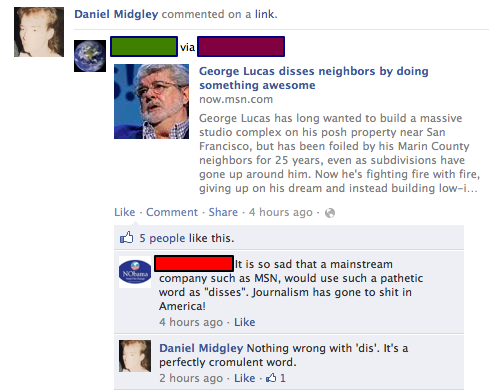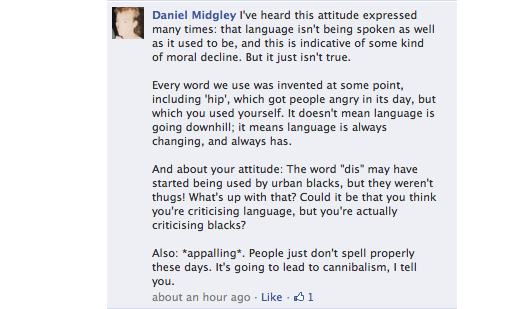I don’t usually share Facebook conversations, but you gotta see this. It’s like a lot of rants from grammar police, but this one hits all the highlights.
Here’s the original grab: “George Lucas disses neighbours by doing something awesome”. One reader looked askance at the appearance of the word ‘diss’.
At this stage, I’ve decided that only a gentle corrective is required. But this reader escalates.
Whoa. Who knew that the word ‘diss’ would cause such an ‘appauling’ ‘degredation’ of language? One would have thought that someone so devoted to the preservation of correct English would… use it. I’m forgiving of bad spelling and punctuation, but not when someone holds themselves up as a protector of language. Grammar police should take note: when you have a rant, it’s a virtual certainty that you’ll start spelling words wrong.
What bugs me most, though, is the presumption that a word that comes from Black American usage is automatically ‘lazy’, ‘degraded’, ‘uneducated’, and ‘eroded’. This is what privileged speakers of the standard variety tend to throw at people who speak non-standard varieties. Racism isn’t cool, but criticising their variety of language is an acceptable substitute.
There’s no linguistic reason to think that there’s anything intrinsically wrong with African-American Vernacular English. Like all language varieties, it’s regular and rule-governed. His rant says nothing about language, and everything about his own attitude towards people of colour. After all, why is he complaining about the slang term ‘diss’, and not the equally slang term ‘awesome’? It’s simple; white people say ‘awesome’, so that’s okay.
So here’s what I usually say to grammar police (plus a poke at the ‘lazy thug’ jibe).
But this reader is not one to hearken to liberal elitist linguistics professors. He responds with a blistering salvo.
Oh, I’m Australian! That explains everything! Who knows what kind of made-up mumbo jumbo they speak?
And then he blocked me, so the fun had to stop.
So let’s finish by noting the common features of the linguistic fascist, all of which are present in this exchange:
- A belief that language change is indicative of some kind of moral decline
- A belief that — not just using non-standard varieties of language, but simply borrowing words from them! — will cause ignorance, indolence, and crime
- A volatile and touchy sense of privilege that easily erupts into attacks of bile
- Terrible spelling and punctuation






14 May 2012 at 2:55 pm
Hilarious. Do you think he meant to write "long term coincidences" or did he spell consequences so badly that his spell-correct read it that way?
14 May 2012 at 3:20 pm
Wow. For a tough talker, the dude sure has thin skin. It is so wimpy when someone can dish it but can't take it, ay? 😛 Good responses on your part, I say. I know I like Aussies for good reasons! (There's my brand of favoritism for ya') 😉
14 May 2012 at 8:10 pm
His penultimate comment had to have been ironic, no? I mean, "I'm proud for ya"? What does that even mean? And misspelling your name? Had to have been on purpose.
Okay, but here's a serious punctuation question:
I'm not trying to peg your mistakes or anything, but in American standard English, it's proper to put the period inside the quotation marks that end a sentence. For instance, you wrote: "Lucas…something awesome". I would say that should be, "…something awesome." Is the rule different for Australian English? Seriously curious about punctuation here.
14 May 2012 at 11:46 pm
Yeah, you're doing it right, but I never liked that rule, so I blithely ignore it in favour of my own rule: If the end punctuation belongs to the thing in quotes, it goes inside the quotes.
• He said, "I poured caramel in your shoes."
• All day long, I listened to "Ga Ga Ga Ga Ga".
• Was it Anderson Cooper who said, "I poured caramel in your shoes"? (but I think US Eng would do this too)
It's probably just my computer science training, but it makes sense to me.
– – – – –
Oh, wow — just noticed that British (and presumably Australia) usage is kind of what I do.
In Britain, they use rules that require the writer to determine whether the period or comma belong with the quotation or are part of the larger sentence.
http://grammar.quickanddirtytips.com/quotation-marks-with-periods-and-commas.aspx
15 May 2012 at 9:38 am
"but you gotta see this"
"gotta"?? Seriously Danial? What is the world coming too?